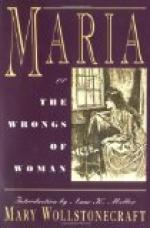Earnestly as Maria endeavoured to soothe, by reading, the anguish of her wounded mind, her thoughts would often wander from the subject she was led to discuss, and tears of maternal tenderness obscured the reasoning page. She descanted on “the ills which flesh is heir to,” with bitterness, when the recollection of her babe was revived by a tale of fictitious woe, that bore any resemblance to her own; and her imagination was continually employed, to conjure up and embody the various phantoms of misery, which folly and vice had let loose on the world. The loss of her babe was the tender string; against other cruel remembrances she laboured to steel her bosom; and even a ray of hope, in the midst of her gloomy reveries, would sometimes gleam on the dark horizon of futurity, while persuading herself that she ought to cease to hope, since happiness was no where to be found.—But of her child, debilitated by the grief with which its mother had been assailed before it saw the light, she could not think without an impatient struggle.
“I, alone, by my active tenderness, could have saved,” she would exclaim, “from an early blight, this sweet blossom; and, cherishing it, I should have had something still to love.”
In proportion as other expectations were torn from her, this tender one had been fondly clung to, and knit into her heart.
The books she had obtained, were soon devoured, by one who had no other resource to escape from sorrow, and the feverish dreams of ideal wretchedness or felicity, which equally weaken the intoxicated sensibility. Writing was then the only alternative, and she wrote some rhapsodies descriptive of the state of her mind; but the events of her past life pressing on her, she resolved circumstantially to relate them, with the sentiments that experience, and more matured reason, would naturally suggest. They might perhaps instruct her daughter, and shield her from the misery, the tyranny, her mother knew not how to avoid.
This thought gave life to her diction, her soul flowed into it, and she soon found the task of recollecting almost obliterated impressions very interesting. She lived again in the revived emotions of youth, and forgot her present in the retrospect of sorrows that had assumed an unalterable character.
Though this employment lightened the weight of time, yet, never losing sight of her main object, Maria did not allow any opportunity to slip of winning on the affections of Jemima; for she discovered in her a strength of mind, that excited her esteem, clouded as it was by the misanthropy of despair.
An insulated being, from the misfortune of her birth, she despised and preyed on the society by which she had been oppressed, and loved not her fellow-creatures, because she had never been beloved. No mother had ever fondled her, no father or brother had protected her from outrage; and the man who had plunged her into infamy, and deserted her when she stood in greatest need of support, deigned not to smooth with kindness the road to ruin. Thus degraded, was she let loose on the world; and virtue, never nurtured by affection, assumed the stern aspect of selfish independence.




